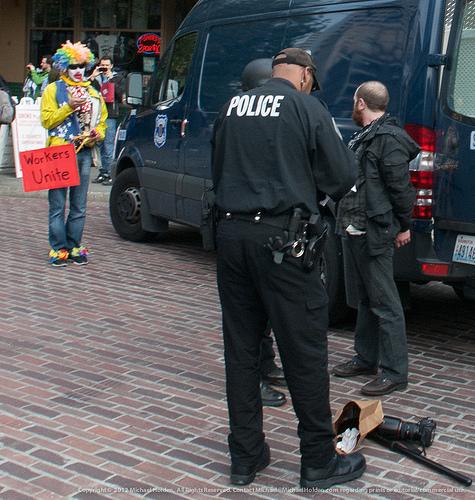Yes, the truth
Will set us free;
But it’s not found
On NBC.
Freedom of the press, that inspired rallying cry of our democracy, is becoming a poignant memory. In its latest ranking of how such freedoms stack up worldwide, Reporters Without Borders ranked the United States No. 47. We certainly rate way better than China, which clocked in at No. 174 out of 179 countries, but this truly is a shameful grade.
“The crackdown on protest movements and the accompanying excesses took their toll on journalists,” the organization noted in its explanation for the nation falling by 27 places in this annual ranking. “In the space of two months in the United States, more than 25 were subjected to arrests and beatings at the hands of police who were quick to issue indictments for inappropriate behavior, public nuisance or even lack of accreditation.”

Police arrest a photographer during a May Day protest in Seattle. (Michael Holden / Flickr)
The attack on media coverage of the Occupy movement’s many strands continued into 2012, particularly in the police’s crackdown in Oakland, California.
Meanwhile, the Pentagon has suppressed data on civilian casualties in all of our many ongoing conflicts, thus leaving the media without critical data.
Even while being stiffed by the feds for basic information, corporate newshounds too rarely raise a stink or ask embarrassing policy questions, and the major media lost interest in the Afghanistan conflict years ago. The chief cause of this government/media non-aggression pact is that the mainstream media now belongs to America’s corporate family. No boat-rocking, please. The 50 corporations that controlled the vast majority of U.S. media operations in 1983, according to researcher Ben Bagdikian, seemed powerful, but by 2001, there were only seven. In the name of consolidation, media companies of all kinds have swallowed up affiliates and subsidiaries to the point where it’s almost impossible to keep track of who owns what. So while most reporters and editors get into the business to serve and protect the public interest, media managers make sure that the business serves itself. Most reporters and editors grasp this reality full well, and so tailor their product to protect their jobs.
Historically, advertising was the driving force behind this self-censorship. Today, given the declining numbers of newspaper readers and TV news junkies and the stiff competition for advertising dollars on the Internet, media outlets are scrambling for an elusive new model to pay the bills. Sure, bonanzas still crop up, such as expensive political campaigns. These aren’t trends to be lightly criticized, either in print or on the air. And so they generally aren’t.
But what about public radio and TV programming? Didn’t the government encourage public broadcasting in large part to ensure that audiences would be offered alternative views? Well maybe, but often that’s not the case. And while PBS and NPR remain dependent on Congress for their legal existence, government spending accounts for only a small portion of their overall budgets. Worse, our “public” radio and TV stations run corporate ads that acknowledge donations that keep them on the air. All those oil company greenwashing commercials make it sound like they only traffic in granola and solar panels.
Today’s top media battles, however, increasingly involve the Internet. Corporate service providers are fighting mightily to have it serve corporate interests, while media reform organizations are striving desperately for journalistic freedom. Worst of all, censorship is gaining ground, especially when it’s disguised as “cybersecurity” measures.
